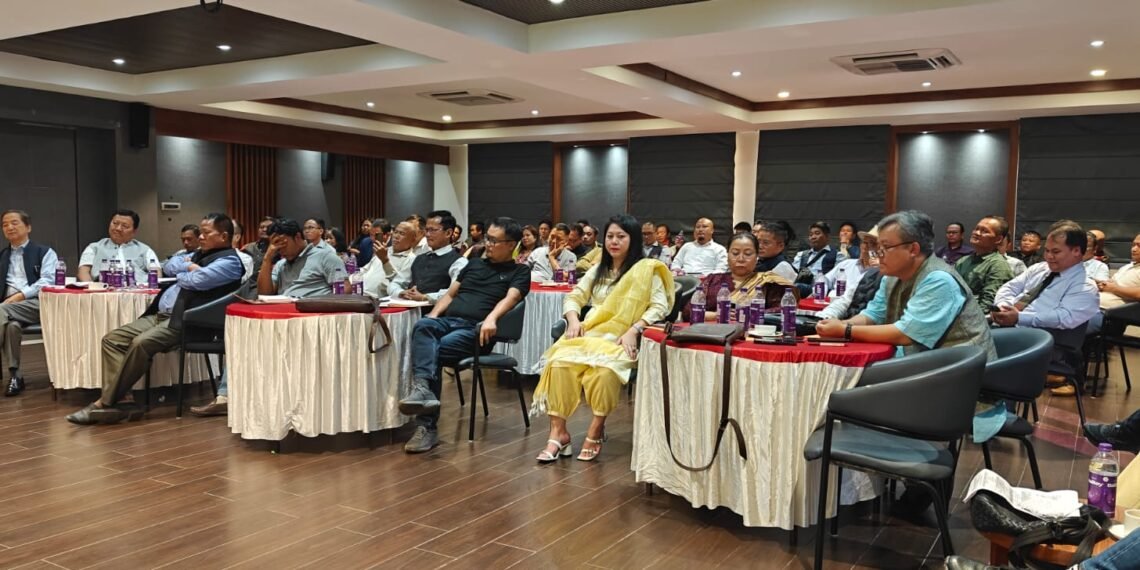Delegates adopted the Nampi Conclave Declaration, which places constitutional redress, political unity, and structured negotiations at the centre of the community’s strategy. A Working Group was set up to coordinate engagement among the KNO, UPF, Kuki-Zo Council and civil society.
BY PC Bureau
November 17, 2025: A two-day conference of Kuki-Zo groups in Guwahati has reaffirmed the community’s core political demand for a Union Territory with a Legislature, resolving to intensify public mobilisation and diplomatic outreach to advance the cause.
The conclave decided to launch coordinated campaigns across Kuki-Zo–inhabited areas, strengthen community-level consensus, and reach out to national and international democratic institutions. Leaders described the push for a Union Territory as a constitutional, non-negotiable aspiration that would be pursued “with unwavering determination” until formally acknowledged by the Government of India as the only path to “peace, justice and long-term stability”.
Delegates also underscored what they termed the Central government’s “urgent and compelling responsibility” to address the long-standing grievances, displacement and hardship faced by the Kuki-Zo people. They called for a comprehensive constitutional and political redressal framework that provides immediate relief and lays the foundation for durable peace.
One of the key organisational decisions of the conclave was the formation of a Working Group, tasked with facilitating structured engagement among the leadership of the Kuki National Organisation (KNO), the United People’s Front (UPF), the Kuki-Zo Council and representatives of civil society. The body will coordinate strategy, ensure internal communication, and maintain coherence in advocacy efforts.
Around seventy delegates participated in the gathering, which deliberated on the evolving political situation in Manipur, the possibility of reviving the state government, and the sustained pursuit of the Kuki-Zo demand for a Union Territory with a legislature. Those present included representatives of the KNO and the UPF—the umbrella organisations of armed groups operating under Suspension of Operation (SoO) agreements with the Ministry of Home Affairs—along with members of the Kuki-Zo Council, civil society bodies and individuals supportive of the movement.
Six of the ten Kuki-Zo MLAs attended the deliberations. Two—Letpao Haokip and Vungzagin Valte—were absent due to health concerns, while two others, Hmar MLA Ngursanglur Sanate and Zomi MLA LM Khaute, did not cite specific reasons for staying away.
The legislators who took part were Haokholet Kipgen, Kimneo Haokip Hangshing, Letzamang Haokip, Chinlunthang, Paolienlal Haokip, and Nemcha Kipgen.
The conclave concluded with the adoption of the Nampi Conclave Declaration (17 November 2025), a comprehensive document outlining the consolidated political, constitutional and organisational aspirations of the Kuki-Zo people.
Declarations and Resolutions
I. Institutional Mechanisms for Governance and Engagement
1. Establishment of a Working Group
A dedicated Working Group will be constituted as the central mechanism for sustained engagement among the KNO, UPF, Kuki-Zo Council and civil society representatives. It will:
• Coordinate political strategy and internal communication
• Facilitate dialogue between SoO groups and civil institutions
• Ensure consistency in messaging, advocacy and constitutional demands
2. Centralisation of Political Mobilisation
The conclave affirmed the Kuki-Zo Council as the apex political body. All future advocacy, mobilisation and campaigns will be directed and overseen exclusively by the Council to avoid fragmentation and ensure unified representation.
3. Formation of a Joint Political Movement Working Committee
A unified KNO-UPF committee will serve as the sole representative platform for political dialogue with the Government of India. It will:
• Present a single negotiation front
• Prepare structured political and constitutional proposals
• Coordinate with the Working Group and the Council for legitimacy and coherence
READ: Major Blow to RPF/PLA: Top Operative Held in Imphal
II. Constitutional and Political Objectives
4. Affirmation of Constitutional Redressal
The Assembly called on the Government of India to address long-standing grievances and suffering through a comprehensive political and constitutional redressal process that ensures immediate relief and long-term stability.
5. Reaffirmation of the Demand for a Union Territory with Legislature
Delegates reiterated their unwavering commitment to the demand for a Union Territory with Legislature. To advance this, they resolved to:
• Launch strategic public campaigns across Kuki-Zo areas
• Mobilise communities to build consensus
• Expand outreach to national and international democratic institutions
The movement, leaders stressed, will remain constitutional, unified and community-driven.
6. Principle of Relentless Pursuit
The Assembly declared that the demand for a Union Territory would be pursued persistently until it receives formal recognition and acceptance from the Government of India.
III. Commemorative Observance
7. Formal Observance of Separation Day
May 3rd will be observed annually as Separation Day to commemorate what the conclave described as a decisive historical turning point in the Kuki-Zo political movement and to honour the community’s resilience.














